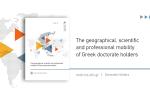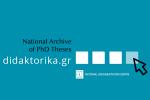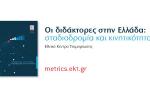
A number of interesting facts about Greek university 2018 doctorates are included in the new National Documentation Centre (EKT) publication ‘Statistics on PhD students graduating from Greek Universities 2018’.
The study ‘Statistics on PhD students who graduated from Greek Universities 2018’ is the fourth in the series published by EKT on an annual basis (previous studies were conducted for the years 2015, 2016, 2017).
Recognising the importance of new doctorate holders as highly qualified human resources, EKT, producer of national statistics on Research, Technology, Development and Innovation, has included indicators that capture essential characteristics in these official statistics. It gives statistics (doctorate distribution per faculty, scientific field, international mobility, previous qualifications, etc.) on new doctorate holders who graduated from Greek universities in 2018.
The publication is also available in an interactive online version. The publication contains also in a special section comparative data analysis of selected indicators for the period 2015-2018 in order to demonstrate trends and temporal variations, and combinatorial indicators for the distribution of new doctoral graduates by gender and age group, gender and scientific field of specialisation, PhD course study, source of funding for their studies, etc.
PhD theses deposited in the National Archive of PhD Theses in 2018, show that 1,624 new doctorates were awarded by Greek universities. As regards the distribution of new doctorates awarded by Greek universities in 2018, most doctoral theses were prepared at the National and Kapodistrian University of Athens and the Aristotle University Thessaloniki, 26.7% and 19.0%, respectively, followed by doctoral theses at the University of Patras, the National Technical University of Athens and the University of Crete (6.8% -8.5%).
Analysis of new doctorate holders shows that both genders are equally represented (50/50),while in terms of age, most of the new doctorate holders in 2018 were below 35 years of age (45.6%), followed by the 36 to 44 years age range (35.5%). Most theses of 2018 were in the Medical and Health Sciences (31.5%), followed by Natural Sciences (22.7%) and Social Sciences (22.0%). There were lower percentages for Engineering and Technology (15.7%), the Humanities (13.5%) and Agricultural Sciences (2.4%).
The combinatorial indicators included in EKT’s new study show that - particularly in the distribution of new doctorate holders per scientific field and gender – in the fields of Agricultural Sciences, the Humanities, Social Sciences, Medical Sciences and Health Sciences there was a predominance of women (58.6%, 57.8%, 53.8% and 52.1%, respectively), while there were more men in the fields of Engineering and Technology and Natural Science (64.6% and 53.4%, respectively).
In terms of the educational level of parents of new doctorate holders 2018, 38.5% of young doctorate holders have at least one parent with a university degree, about 30.6% are secondary school graduates, about 11.5% primary school graduates, about 8.7% PhD holders and 6.8% have a Master's degree.
As for the main source of financing of doctoral studies, for 39.4% of new doctorates 2018, key sources were personal savings and support from family, while 25.1% received scholarships from Greek institutions.
As regards the geographical mobility of doctorates, 322 people (22.5% of all responses) resided abroad during their doctoral studies for other than tourism reasons. Popular countries were the United Kingdom (26.3%) and Germany (16.7%).
With reference to the preparation time of their thesis, the cumulative duration of study was, for about 51.0%, between 4 to 6 years. Percentages for those taking 7, 8 and 9 years to complete their thesis were 12.8, 10.6 and 6.1, respectively). 6.1% of doctoral students completed their thesis within 3 years.
The section of the study covering trends among Greek doctorate holders based on the evolution of selected indicators from the set of data contained in EKT’s respective annual publications for the period 2015-2018, indicates that generally most doctoral theses were completed in 4-7 years, and reflects a steady reduction in the duration from year to year.
More specifically, most of the 2015 new doctorate holders took six years to complete their thesis (26.5%), the majority in 2016 took seven years (18.0%), in 2017, the majority took five years (20 , 6%), while the majority in 2018 took four years (17.8%).
Data are drawn from the National Archive of PhD Theses, for which EKT has had the legal mandate since 1985, ensuring completeness of the coverage of this population. With more than 42,000 doctoral theses available online, the National Archive of PhD Theses is a unique repository with the highest quality of Greek scientific output and knowledge.















